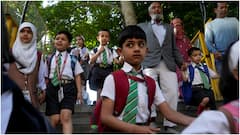Top Strategies For Ensuring Future Success Through Early Childhood Education
Early childhood education is essential for lifelong learning, as 90% of brain development occurs by the age of five.

By Mr. Amit Baveja
As 90% of a child’s brain develops by five years of age, early childhood education is the bedrock for lifelong learning. However, despite significant advancements, the field still faces challenges impacting the effectiveness of foundational learning experiences. Adopting the following teaching methodologies can optimise classroom outcomes, support holistic development, and ultimately prepare young learners for future academic and personal success.
Strengthening Parent-Teacher Partnerships
While teachers play a vital role in academic development, parents reinforce learning at home. Parents' involvement in understanding classroom goals and activities creates a continuity of learning beyond the classroom. Schools can consider integrating workshops, regular interactions, and updates for parents to enhance their role as learning partners for their children.
Adopting Developmentally Appropriate Practices (DAP)
Research suggests that only 15% of grade 2 learners can read grade-appropriate texts, and 38% of students of grade 1 from rural backgrounds need help even to recognise the numbers. To remedy this, the National Curriculum Framework for Foundational Stage (NCF-FS) 2022 has laid a solid foundation for developmentally appropriate practices considering children's developmental readiness. For instance, tasks like cursive writing may be too demanding for children under five, as their fine motor skills are still developing. Research-backed and age-sensitive curricula should be prioritised, ensuring activities are aligned with children's physical and mental development.
Competency Building And Cognitive Development
Incorporating activities that cater to competency building, such as rhymes, music, and hands-on activities, fosters cognitive development by engaging the entire brain. Singing, for example, soothes young learners and enhances memory and language skills by activating different parts of the brain. Educators can enhance the lessons further by explaining the purpose behind various activities to help children understand the “why” of learning, making lessons more meaningful.
Ensuring Inclusivity And Cultural Sensitivity
Inclusivity remains another area where early childhood education needs improvement. Traditional gender stereotypes and social biases subtly embedded in educational resources shape young minds. Incorporating inclusive, culturally sensitive resources in the curriculum can make early education a safe space that respects diversity.
Fostering Critical Thinking In Language Learning
Rather than focusing on just memorising, language education should encourage children to think critically. Much like solving a puzzle, teaching language as a structured system can promote a deep understanding of linguistic rules. Teachers can introduce simple grammar games and storytelling that require problem-solving, improving language acquisition and nurturing analytical thinking skills.
Emphasising Socio-Emotional And Ethical Development
While policies around socio-emotional learning exist, their implementation often lacks depth. Integrating emotional literacy into daily routines can give children the tools to express their feelings, resolve conflicts, and cultivate empathy. Teachers and parents can benefit from targeted training in emotional intelligence and communication techniques to create emotionally supportive environments.
As we step into an era of rapid transformation, a child-centric approach that addresses cognitive, social, emotional, and ethical development will lay a strong foundation for lifelong learning and adaptability. We at Burlington English are committed to fostering strong partnerships with parents, adopting developmentally appropriate practices, and focusing on holistic, inclusive, and competency-driven education in the foundational years to create rich learning environments0
Research
- Research indicates that 90 percent of a child’s brain development happens by five years of age.
- It is estimated that an investment in Foundational Literacy and Numeracy for each cohort in India can lead to gains in GDP by as much as 7.39 percent. (FLN 2022)
- Only 15% children in Std II can read grade appropriate text (ASER 2018)
- Only 10% children in Std II can subtract (ASER 2018)
- In rural areas, 48% of students in grade 1 cannot read the alphabet, and 90% cannot read simple words of English (ASER 2023)
- 38% students of grade 1 from rural background cannot even recognise the numbers 1-9 (ASER 2023)
- Geographic disparity - the foundational literacy rates in states like Kerala and Himachal Pradesh were as high as 53 and 48 percent respectively, states like Tamil Nadu and MP showed abysmally low levels with foundational literacy rate being 10 and 18 percent respectively. (ASER 2018)
- As per the NSSO data, while for the nation as a whole, the literacy rate for males is 84.7 percent, the same for females is as low as 70.3 percent. (NSS 2018)
- 11% of grade 3 students lack the most basic knowledge and skills at their grade level. (FLS 2022)
- 37% of grade 3 students have limited knowledge and skills for their grade level. (FLS 2022)
(The Author is the Managing Director at Burlington English, India & Southeast Asia)
[Disclaimer: The opinions, beliefs, and views expressed by the various authors and forum participants on this website are personal and do not reflect the opinions, beliefs, and views of ABP News Network Pvt Ltd.]
Education Loan Information:
Calculate Education Loan EMI






































